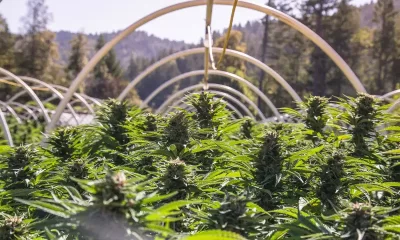Business
Moxie: A California Legacy With a History of Quality

A history of the award-winning, multistate operator Moxie.
As cannabis policy reform measures continue to take hold across the country, nearly half the states in the nation have now legalized recreational marijuana. With each new state comes new opportunities that have spawned thousands of cannabis operators from coast to coast. But with so many brands out there, consumers can find it difficult to choose new cannabis products with confidence.
Choosing products from a company with a strong history can be one way to navigate through all the brands found at a local dispensary. In four states with legal weed, consumers are finding that California-based Moxie fits the bill as a company with roots in the legacy market that pairs top-of-line genetics with innovative processes to create products that have won more than 100 coveted cannabis industry awards, including dozens of High Times Cannabis Cup trophies.
Since the company’s inception nearly a decade ago, Moxie has prided itself on producing potent, flavorful concentrates fit for the most discriminating cannabis connoisseurs. That reputation continues today with its extensive line of top-self cannabis flower and extractions. Utilizing pharmaceutical-grade technology and strict safety standards in their cultivation facilities, Moxie provides customers with high-quality recreational and medical marijuana products from its library of hundreds of cannabis varietals.
Moxie was founded in California in 2014, even before recreational marijuana was legalized in the state. Operating under Proposition 215, the groundbreaking ballot measure that legalized medical marijuana in 1996, Moxie’s founders set out to make industry-leading concentrates to provide medicinal cannabis patients with effective and enjoyable formulations. Only a year later, the company took advantage of the growing medical cannabis environment and became a multi-state cannabis operator (MSO) with an expansion into the Michigan and Nevada medical marijuana markets in 2016.
The same year, California voters took the next step in ending the prohibition of cannabis with the passage of Proposition 64, the ballot initiative that legalized recreational marijuana in the Golden State. One year later, the company cemented its place in weed history as the first cannabis company to be licensed by California regulators. The milestones continued to come only one year later with the expansion into Pennsylvania’s medical marijuana market and the 2018 opening of one of the state’s first grower/processor facilities in the state. The same year, Moxie was recognized as the Brand of the Year at the California Cannabis Association Awards.
Recognizing the need for a cannabis industry that treads lightly on the environment, Moxie launched the company’s sustainability efforts in 2020, pledging to be the first carbon-negative cannabis operator. In pursuit of the company’s sustainability goals, Moxie has overhauled its packaging by reducing the use of plastic and using FSC-certified paper, grass paper labels and chlorine-free dyes. Additionally, Moxie’s indoor cannabis cultivation facilities have been outfitted with energy-efficient LED grow lights to maximize efficiency, and the company is working with waste management companies to convert production waste into energy.
Moxie And High Times
The next big step in Moxie’s history came in 2022 when Hightimes Holding Corporation, the owner of High Times, announced that it had entered into an agreement to acquire Moxie’s California operations. The acquisition gives High Times new cannabis cultivation and production capabilities to complement its current portfolio of cannabis holdings in California, the largest legal marijuana market in the world, where it operates branded dispensaries and offers licensed cannabis products. The deal also makes High Times the most well-known brand in the Golden State with a vertically integrated cannabis operation.
“One of Moxie’s most important goals since our founding has been to create cannabis products that are trusted equally by consumers and regulators, which is why we carefully monitor every stage of the cultivation, production, and distribution process,” Jordan Lams, CEO and founder of Moxie, said about the agreement at the time. “High Times shares this belief in the importance of taking care of the cannabis plant and we’re very confident that all Moxie products will continue to be of the highest quality and maintain the trust of local governments and consumers. Our goal now is to continue to bring the Moxie product to markets across the country and maintain these company-wide best practices, while also continuing to be aware of the unique qualities and preferences in each state.”
Currently, Moxie can be found in four states—California, Missouri, Utah and Pennsylvania. The company’s genetics are grown and packaged as cured cannabis flower, or processed into a variety of concentrates. Live resin badder and sauce offer dabs with superior potency and flavor, while vape carts and pods provide convenience. In addition to Moxie, the company’s family of brands includes MX, HighNow and MX Sport, all available at select licensed dispensaries.
Source: https://hightimes.com/business/moxie-a-california-legacy-with-a-history-of-quality/
Business
New Mexico cannabis operator fined, loses license for alleged BioTrack fraud

New Mexico regulators fined a cannabis operator nearly $300,000 and revoked its license after the company allegedly created fake reports in the state’s traceability software.
The New Mexico Cannabis Control Division (CCD) accused marijuana manufacturer and retailer Golden Roots of 11 violations, according to Albuquerque Business First.
Golden Roots operates the The Cannabis Revolution Dispensary.
The majority of the violations are related to the Albuquerque company’s improper use of BioTrack, which has been New Mexico’s track-and-trace vendor since 2015.
The CCD alleges Golden Roots reported marijuana production only two months after it had received its vertically integrated license, according to Albuquerque Business First.
Because cannabis takes longer than two months to be cultivated, the CCD was suspicious of the report.
After inspecting the company’s premises, the CCD alleged Golden Roots reported cultivation, transportation and sales in BioTrack but wasn’t able to provide officers who inspected the site evidence that the operator was cultivating cannabis.
In April, the CCD revoked Golden Roots’ license and issued a $10,000 fine, according to the news outlet.
The company requested a hearing, which the regulator scheduled for Sept. 1.
At the hearing, the CCD testified that the company’s dried-cannabis weights in BioTrack were suspicious because they didn’t seem to accurately reflect how much weight marijuana loses as it dries.
Company employees also poorly accounted for why they were making adjustments in the system of up to 24 pounds of cannabis, making comments such as “bad” or “mistake” in the software, Albuquerque Business First reported.
Golden Roots was fined $298,972.05 – the amount regulators allege the company made selling products that weren’t properly accounted for in BioTrack.
The CCD has been cracking down on cannabis operators accused of selling products procured from out-of-state or not grown legally:
- Regulators alleged in August that Albuquerque dispensary Sawmill Sweet Leaf sold out-of-state products and didn’t have a license for extraction.
- Paradise Exotics Distro lost its license in July after regulators alleged the company sold products made in California.
Golden Roots was the first alleged rulebreaker in New Mexico to be asked to pay a large fine.
Source: https://mjbizdaily.com/new-mexico-cannabis-operator-fined-loses-license-for-alleged-biotrack-fraud/
Business
Marijuana companies suing US attorney general in federal prohibition challenge

Four marijuana companies, including a multistate operator, have filed a lawsuit against U.S. Attorney General Merrick Garland in which they allege the federal MJ prohibition under the Controlled Substances Act is no longer constitutional.
According to the complaint, filed Thursday in U.S. District Court in Massachusetts, retailer Canna Provisions, Treevit delivery service CEO Gyasi Sellers, cultivator Wiseacre Farm and MSO Verano Holdings Corp. are all harmed by “the federal government’s unconstitutional ban on cultivating, manufacturing, distributing, or possessing intrastate marijuana.”
Verano is headquartered in Chicago but has operations in Massachusetts; the other three operators are based in Massachusetts.
The lawsuit seeks a ruling that the “Controlled Substances Act is unconstitutional as applied to the intrastate cultivation, manufacture, possession, and distribution of marijuana pursuant to state law.”
The companies want the case to go before the U.S. Supreme Court.
They hired prominent law firm Boies Schiller Flexner to represent them.
The New York-based firm’s principal is David Boies, whose former clients include Microsoft, former presidential candidate Al Gore and Elizabeth Holmes’ disgraced startup Theranos.
Similar challenges to the federal Controlled Substances Act (CSA) have failed.
One such challenge led to a landmark Supreme Court decision in 2005.
In Gonzalez vs. Raich, the highest court in the United States ruled in a 6-3 decision that the commerce clause of the U.S. Constitution gave Congress the power to outlaw marijuana federally, even though state laws allow the cultivation and sale of cannabis.
In the 18 years since that ruling, 23 states and the District of Columbia have legalized adult-use marijuana and the federal government has allowed a multibillion-dollar cannabis industry to thrive.
Since both Congress and the U.S. Department of Justice, currently headed by Garland, have declined to intervene in state-licensed marijuana markets, the key facts that led to the Supreme Court’s 2005 ruling “no longer apply,” Boies said in a statement Thursday.
“The Supreme Court has since made clear that the federal government lacks the authority to regulate purely intrastate commerce,” Boies said.
“Moreover, the facts on which those precedents are based are no longer true.”
Verano President Darren Weiss said in a statement the company is “prepared to bring this case all the way to the Supreme Court in order to align federal law with how Congress has acted for years.”
While the Biden administration’s push to reschedule marijuana would help solve marijuana operators’ federal tax woes, neither rescheduling nor modest Congressional reforms such as the SAFER Banking Act “solve the fundamental issue,” Weiss added.
“The application of the CSA to lawful state-run cannabis business is an unconstitutional overreach on state sovereignty that has led to decades of harm, failed businesses, lost jobs, and unsafe working conditions.”
Business
Alabama to make another attempt Dec. 1 to award medical cannabis licenses

Alabama regulators are targeting Dec. 1 to award the first batch of medical cannabis business licenses after the agency’s first two attempts were scrapped because of scoring errors and litigation.
The first licenses will be awarded to individual cultivators, delivery providers, processors, dispensaries and state testing labs, according to the Alabama Medical Cannabis Commission (AMCC).
Then, on Dec. 12, the AMCC will award licenses for vertically integrated operations, a designation set primarily for multistate operators.
Licenses are expected to be handed out 28 days after they have been awarded, so MMJ production could begin in early January, according to the Alabama Daily News.
That means MMJ products could be available for patients around early March, an AMCC spokesperson told the media outlet.
Regulators initially awarded 21 business licenses in June, only to void them after applicants alleged inconsistencies with how the applications were scored.
Then, in August, the state awarded 24 different licenses – 19 went to June recipients – only to reverse themselves again and scratch those licenses after spurned applicants filed lawsuits.
A state judge dismissed a lawsuit filed by Chicago-based MSO Verano Holdings Corp., but another lawsuit is pending.
Source: https://mjbizdaily.com/alabama-plans-to-award-medical-cannabis-licenses-dec-1/
-

 Business2 years ago
Business2 years agoPot Odor Does Not Justify Probable Cause for Vehicle Searches, Minnesota Court Affirms
-

 Business2 years ago
Business2 years agoNew Mexico cannabis operator fined, loses license for alleged BioTrack fraud
-

 Business2 years ago
Business2 years agoAlabama to make another attempt Dec. 1 to award medical cannabis licenses
-

 Business2 years ago
Business2 years agoWashington State Pays Out $9.4 Million in Refunds Relating to Drug Convictions
-

 Business2 years ago
Business2 years agoMarijuana companies suing US attorney general in federal prohibition challenge
-

 Business2 years ago
Business2 years agoLegal Marijuana Handed A Nothing Burger From NY State
-

 Business2 years ago
Business2 years agoCan Cannabis Help Seasonal Depression
-

 Blogs2 years ago
Blogs2 years agoCannabis Art Is Flourishing On Etsy













